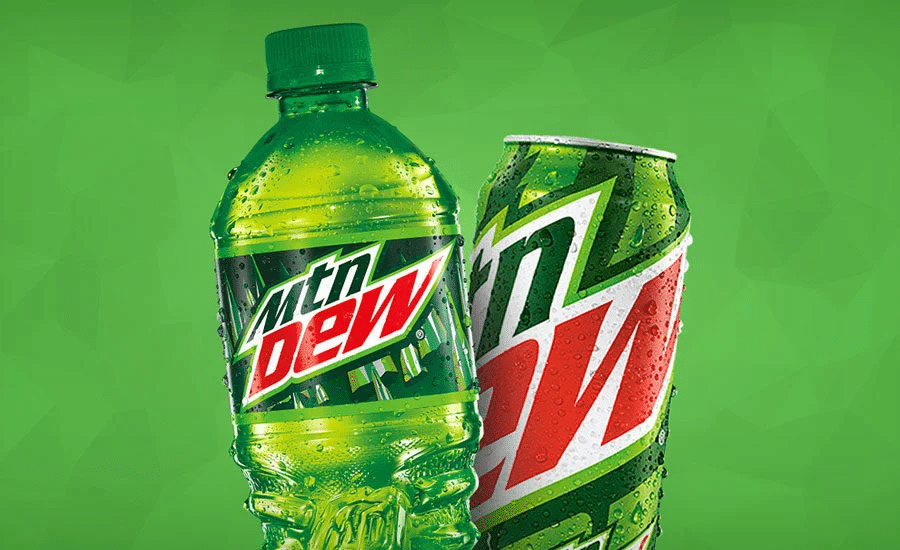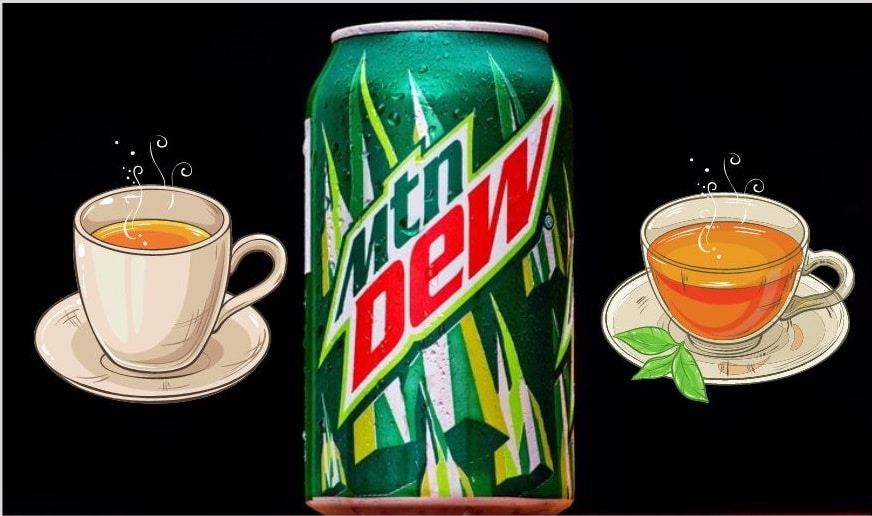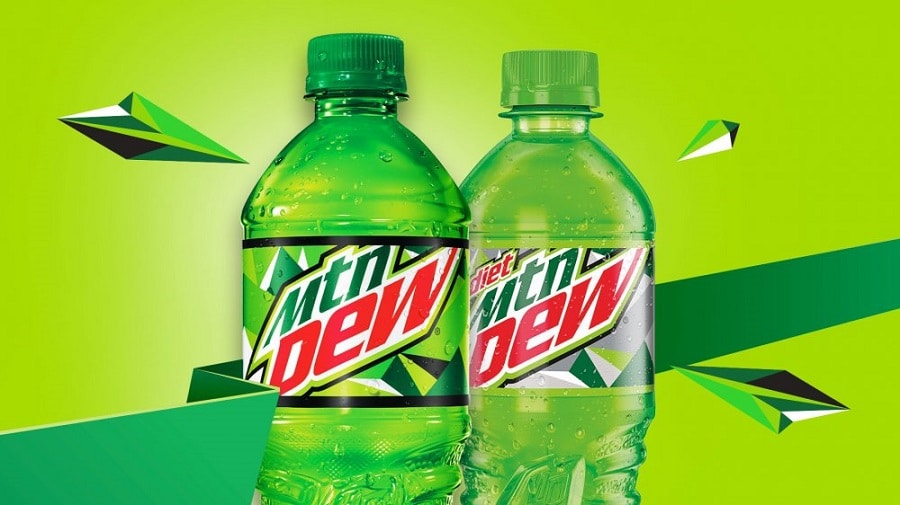Learn about the surprising amount of caffeine in Mountain Dew and its potential health risks due to its high sugar content. Discover the caffeine levels in other drinks and how to reduce your caffeine intake. Find out if Mountain Dew is a good alternative to coffee for a quick energy boost.
Mountain Dew is a popular soft drink that has been around since 1940. It is a favorite of many people, especially those who do not like coffee or are in a hurry and cannot make coffee. One of the most commonly asked questions about Mountain Dew is whether it contains caffeine or not. We will look at the caffeine content in Mountain Dew and compare it to other drinks. Furthermore, we will also look at the effects of caffeine on the body and how to reduce your caffeine intake. So if you are a fan of Mountain Dew, or if you are just curious about its caffeine content, read on to find out more.
What Are The Ingredients In Mountain Dew?

Mountain Dew is a popular fizzy beverage that made its debut in 1940. Initially, its recipe included a combination of water, sugar, and lemon juice. Presently, although the ingredients have been tweaked slightly, lemon juice and sugar remain their main components. Apart from these, the drink now also includes high fructose corn syrup, a mix of natural and artificial flavors, caffeine, and sodium benzoate.
Does Mountain Dew Have Caffeine?
Yes, Mountain Dew has caffeine, with a 12-ounce can providing 41 mg of the stimulant. It's worth noting that the popular soda also has a significant sugar content, with the same serving size containing 41 grams of sugar – equivalent to over 10 teaspoons of sugar. Those concerned about their sugar consumption may want to consider alternative beverages.
What Is The Caffeine Content Of Mountain Dew?
When compared to other soft drinks like Coca-Cola, Mountain Dew has a higher caffeine concentration, with approximately 54mg of caffeine per 12-ounce serving. Only Surge, another soda brand, surpasses Mountain Dew in caffeine content with 68mg per 12-ounce serving.
While there are sodas with higher caffeine levels, they are usually sugar-free or low-calorie options, such as Zevia (68mg) and Pepsi Zero (69mg). It's important to be aware of the caffeine content in your favorite beverages, especially if you are sensitive to its effects.
Caffeine Content Comparison: Mountain Dew Vs Coffee Vs Tea

If you're looking for a caffeine fix, you might wonder how Mountain Dew stacks up against coffee and tea. Although Mountain Dew contains more caffeine than most sodas, it still falls short compared to your regular cup of coffee.
Here's a breakdown of the caffeine content in each drink per 12oz serving:
- Coffee: With a whopping 136mg of caffeine per serving, coffee dominates the caffeine game.
- Black Tea: At around 63mg of caffeine per serving, black tea still has more caffeine than Mountain Dew but is significantly less potent than coffee.
- Mountain Dew: With only 54mg of caffeine per serving, Mountain Dew can't compete with coffee but is still a better option than most sodas.
- Green Tea: Green tea contains even less caffeine than Mountain Dew with only around 45mg per serving, making it the least potent option on this list.
The Mechanisms Behind Caffeine's Effects on the Body and Mind
Caffeine exerts its effects by binding to adenosine receptors in the brain and blocking their activity. This results in increased activity of neurotransmitters like dopamine and norepinephrine, which can lead to heightened alertness and improved cognitive function.
In addition to its effects on the brain, caffeine can stimulate the cardiovascular system, increasing heart rate and blood pressure. However, excessive intake can lead to negative side effects such as anxiety, irritability, and restlessness.
Potential Risks Of Excessive Mountain Dew Consumption

While enjoying a can or bottle of this drink occasionally is unlikely to cause harm, drinking too much of it can have negative consequences. Such a condition may manifest in symptoms such as jitteriness, nervousness, difficulty sleeping, palpitations, and lightheadedness. If you observe any of these symptoms, it is advisable to reduce your caffeine intake to avoid further complications.
Caffeine Levels In Popular Beverages
It's important to be aware of the caffeine levels in popular beverages, especially if you're sensitive to caffeine or trying to limit your intake. Here's a breakdown of the caffeine levels in different drinks:
- Soft Drinks (Cola): A 12 oz can or bottle of cola typically contains 23-35 mg of caffeine.
- Energy Drinks: An 8 oz serving of energy drinks can contain 50-180 mg of caffeine, which is often more than a cup of coffee.
- Chocolate Milk: An 8 oz serving of chocolate milk typically contains 5-35 mg of caffeine, depending on the brand.
- Tea: An 8 oz cup of tea can contain 14-60 mg of caffeine, depending on the type of tea and how it's brewed.
- Decaffeinated coffee: An 8 oz cup of decaf coffee typically contains 2-5 mg of caffeine.
- Coffee: An 8 oz cup of coffee can contain anywhere from 95-200 mg of caffeine, depending on the type of coffee and how it's brewed.
Ways To Lower Your Caffeine Consumption

If you feel like you consume too much caffeine and want to reduce your intake, there are a few strategies you can employ. Here are three ways to lower your caffeine consumption:
Choose Healthier Beverage Options:
Sugary soft drinks, such as Mountain Dew, can contain high levels of caffeine and sugar. Opt for healthier beverage options like water or unsweetened tea to quench your thirst and stay hydrated.
Swap To Decaf:
Consider switching from regular coffee or tea to decaf versions. You can still enjoy the same flavor without the caffeine jolt.
Reduce Energy Drink Consumption:
Energy drinks can have high levels of caffeine and other stimulants that can lead to negative health effects. Instead of drinking multiple energy drinks daily, aim to have one every other day or less frequently.
What Is The Safe Amount Of Caffeine Consumption?
The amount of caffeine that an individual can consume safely varies from person to person due to differences in metabolism. Nevertheless, it is generally accepted that up to 400mg of caffeine per day is safe for most people. Consuming more than this amount may result in adverse effects such as anxiety, insomnia, and even heart palpitations.
Conclusion
Mountain Dew does contain caffeine, with approximately 54mg of caffeine per 12-ounce serving. While it may not compete with coffee, it is still a better option than most sodas. However, it is worth noting that the popular soft drink also has a significant sugar content, with the same serving size containing 41 grams of sugar.
It's essential to be aware of the caffeine content in popular beverages, especially if you are sensitive to its effects. Choosing healthier beverage options like water or unsweetened tea can help reduce caffeine consumption.